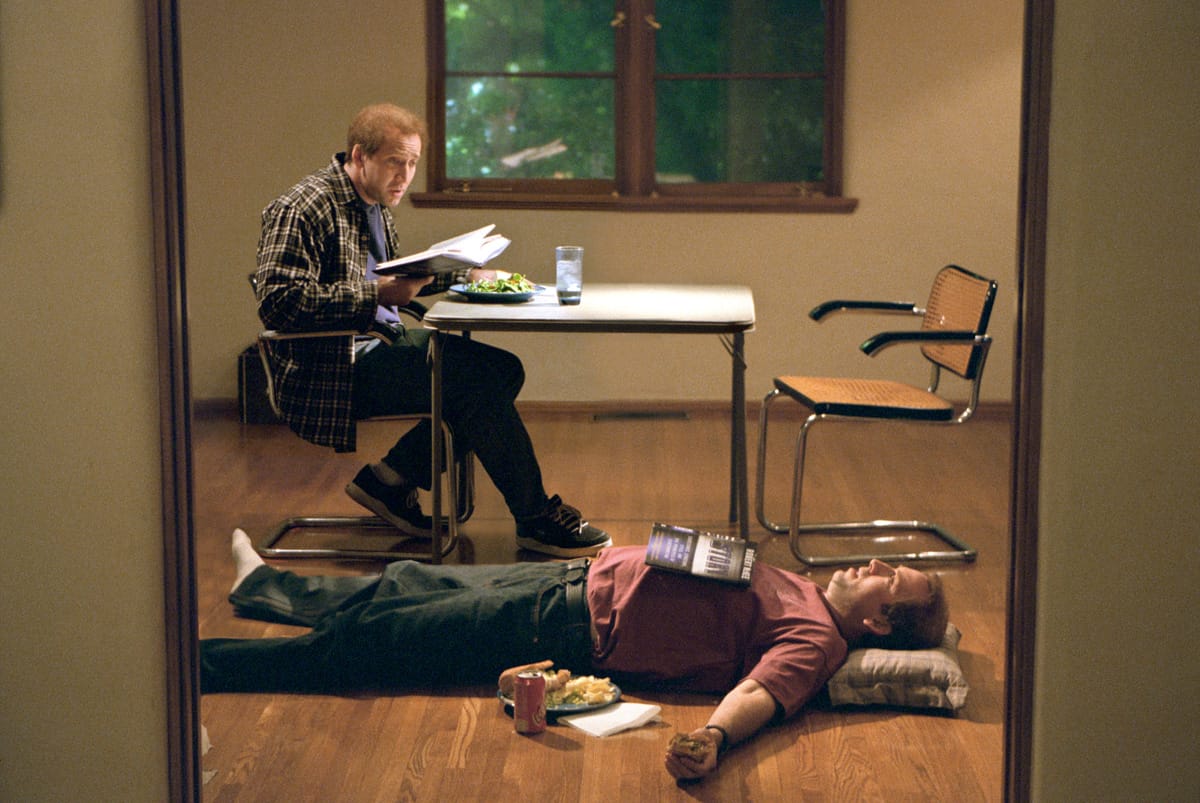Adaptation (2002)

[May 2010 Update: This review is eight years old. It's been off of the website for a while because it needed some slight revisions. My first encounter with the movie was very, very different from my second viewing. I've watched it several times since then and come to appreciate it much, much more. So here is an updated version of my original review of Adaptation.]
Here’s the pitch:
Jeffrey Overstreet is a film critic with an assignment to review the bizarre, relentlessly clever movie Adaptation, from director Spike Jonze and screenwriter Charlie Kaufman.
He’s excited about it. He’ll get to lavish praise on Nicolas Cage for the actor’s best performance in many years, and he’ll get to point out the cleverness of the Jonze/Kaufman team. Their last collaboration was Being John Malkovich, which challenged viewers to sort out a confusing jumble of perspectives and non-chronological sequences. Adaptation works in a similar way.
But Overstreet is filled with angst about reviewing the film for several reasons:
- He finds it difficult to summarize the film without spoiling its many clever surprises.
- While he’s mightily impressed by the film’s first-rate craftsmanship, the characters are so resolutely selfish and self-absorbed, their company becomes wearying, and we are offered little hope that it is possible for them to find meaningful lives or rewarding relationships.
But Overstreet will review the film. He has a deadline. Perhaps the best way to write about the film is to write about his own attempts to review the film. Is that self-absorbed?
First, he should set up the plot for readers as simply as possible:
Adaptation
The book in question is Susan Orlean’s The Orchid Thief. And yes, this is what began the real Kaufman’s journey to making Adaptation - a request to write a good film from a plot-less collection of articles.)
Already, Overstreet is having trouble making the details clear. After all, Susan Orlean, like Charlie Kaufman, is a real person too, and so is her book The Orchid Thief. But in the film, Orlean is played by Meryl Streep, and her behavior strongly suggests that this version of Orlean bears little resemblance to the real person.
Back to the summary:
There’s a problem. The studio wants a “hit”. Thus, they want Kaufman’s movie to feature car-chases, violence, and implausibly sappy romance. Kaufman loathes the cheap tricks of conventional films. But he’s running into the worst writer’s block this side of Barton Fink. Thus, we are treated to Kaufman sweating, Kaufman ranting, Kaufman pacing.
Overstreet stops there. He is thinking about Barton Fink. Barton Fink – a film he dearly loves – is also dark and bleak and full of self-absorbed characters. Both films portray the world as a dangerous place in which it is difficult to form meaningful bonds with others. Why does Adaptation feel more oppressive? What is the difference? He thinks it through, and stumbles onto a possibility:
Adaptation also has a character who offers kindness and some measure of grace, but that character is portrayed as such a compromising buffoon that he’s hardly admirable. That character is Kaufman’s twin brother Donald. (Donald doesn’t exist in real life but who plays an important part in the film.)
Unlike Charlie, Donald is an aspiring screenwriter, a humble man, unafraid of asking for advice, and seemingly comfortable with his couch-potato physique. He has no qualms about playing the commercial movie game. Donald happily pounds out an implausible, ridiculous, cliché-ridden screenplay about a serial killer called the Deconstructionist (of course) who chops up his victims. His shallowness nearly drives his brother Charlie insane. And yet, his goodness will eventually play a larger part in his brother's trials.
Overstreet bites his tongue. He’s going too far. He gets up from his chair, paces back and forth. He’s got to stop and wrap up this review. He’ll try focusing on the good things. He’ll praise the technical aspects of the film, which are indeed praiseworthy:
As Charlie and Donald, Cage has found roles that show he's still capable of great acting. This is his best work since Leaving Las Vegas. Oh, he’s had some memorable turns since then, especially Bringing Out the Dead and Face/Off, but for the most part he’s been an action figure and a headliner in flashy action throwaways like Gone in 60 Seconds and sentimental clichés like The Family Man. Here, he’s wonderfully funny, he wins our sympathies, and he makes the struggle between artistic integrity and compromise compelling.
Meryl Streep lives up to her reputation as well, making the movie’s version of Susan Orlean a melancholy, funny, and deeply sad woman who is capable of deplorable acts of self-preservation and self-destruction.
Chris Cooper is also fantastic, giving a career-capping performance as the orchid expert, John Laroche, who develops a tenuous friendship with Orlean as she interviews him about his passion for flowers. Cooper deserves an…
Overstreet stops again. He almost said “Cooper deserves an Oscar nomination,” but that’s such a predictable “critic” thing to say. Good writers avoid clichés. So Overstreet worries about how to continue with his review without just sounding like a hack. He tries philosophizing about the film’s subtext:
The orchid survives by constantly changing itself in order to get what it wants. And the characters in the film try to do the same thing. But it is interesting: As these characters compromise and abandon morality in order to get what they want, they become weaker, more self-centered, even mean-spirited. Laroche sees no difference between his passion for the beauty of orchids and his "passion" for making money off of pornography. Orlean's desire to discover her own passion leads to indulgence, weakness, and violence.
Kaufman's observes this without preaching, without spelling out what our conclusions should be. But for those with eyes to see, it should be clear: Striving for mere survival leads to dissatisfaction and malnourishment of the soul. All of these lost characters must learn to humble themselves, submit to the constraints that have been set for us, and employ their talents to serve others even if the process becomes embarrassing. When one's own survival is the goal, anything goes, and thus the world gets darker.
It is clear that living things in the world seek to preserve their lives. It is certainly the dominant way. But is it the best way for humans to find fulfillment and joy? Why is it that we praise love, which seems to require the opposite of self-preservation? Love asks us to be vulnerable and offer ourselves up for the good of others.
The first time I watched Kaufman's film, I felt unsatisfied and discouraged. I felt that he was shrugging his shoulders and saying, "You’ll be lost and lonely and unsatisfied unless you compromise your standards and play dirty... and then you're just pathetic." But upon a second viewing, I now think he has painted a poignant portrait of a man struggling to find fulfillment, a man who learns the value of putting aside his own desires to serve the needs and desires of others.
The review is getting too long. Agitated by caffeine and his own carelessness, Overstreet checks his watch and decides to wrap things up.
Nicolas Cage says of Kaufman, “I discovered that Charlie was someone who is very devoted to being honest and totally naked in his art. He wants to rip the masks off himself, off everybody.” Unfortunately, through Charlie’s eyes, the faces behind those masks are all about need and devoid of the desire to give. Thus, they may find fleeting happiness, but they will not know joy or true fulfillment.
In the character of Donald, Kaufman has given us a signpost to the truth. The meaningful life is not the one that adapts in order to survive, but the one that puts aside earthly worries and offers itself in service of others. Adaptation suggests that there is something "not of this earth" about humanity, that we are meant for higher, better things than mere adaptation.
Jeffrey Overstreet walks away troubled by the oppressive unpleasantness of Adaptation's view of the world. Yet, he is again convinced that sometimes we can find glimmers of truth and redemption in the darkest places, that visions of sadness can point the way to joy, and that the truth can shine through even the bleakest storytelling.

